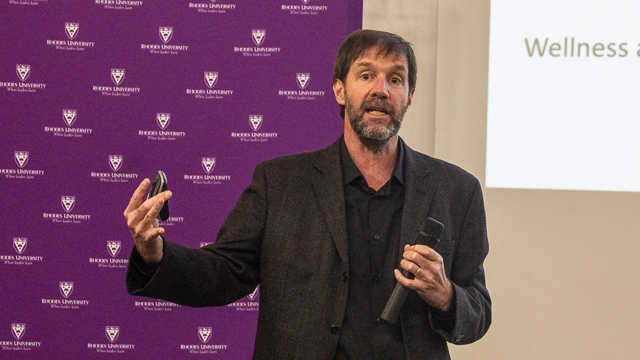
By Sam van Heerden
In a transforming society, the way we think about teaching economics needs to change. Economics lecturer, Mr David Fryer, won the Vice-Chancellor's Distinguished Teaching Award in 2020 and presented his accompanying lecture last week, focusing on the potential to reconfigure undergraduate economics so that it is more in touch with the realities of students and the futures they face.
The Vice-Chancellor's Distinguished Teaching Award is presented annually to an individual who has demonstrated to a panel of peers that their work as an academic teacher is truly distinguished. The award is meant to recognise and celebrate excellence, innovation, and dedication in and to teaching.
Professor Fryer has been teaching economics for 25 years and has shown a demonstrable passion for teaching and the power of education to transform society. Having witnessed dramatic changes in society and seeing these reflected on campus and in the classroom, he has been committed to teaching in these transforming environments in a proactive and caring way.
His lecture focused on such an occasion of dedication. When teaching second-year economics students a few years ago, he faced a dilemma often presented to teachers: "Particularly when we look at undergraduates, pass rates are always a struggle. The worry is that if we maintain standards, then the pass rates are going to drop, and this undermines the broader project of upward mobility.”
Undergraduate teaching and learning are central to promoting the upward mobility of the economically disadvantaged in a democratic society, as education generally leads to greater chances of economic success and more active and critical citizens. "The choice seems to be either to lower standards or face crippling failure rates, both of which prevent the ultimate goal of public education."
But Fryer demonstrated during his lecture that this ultimatum is false: it is possible to both improve pass rates and maintain standards by changing how we look at the requirements and goals of education. The pertinent question seems to be who and what academic standards are for.
"Most of our students will not go on to become economists or even progress to postgraduate level at all," said Fryer. "So our task is not merely to contribute to the building of an elite cadre of policymakers, academic economists, and business leaders – vital though this is."
Fryer said many who go through university would become a part of the middle class, whose size and disposition are critical to the country's future. He suggests that the way economics is taught should adapt to these conditions. It should be done by ensuring a quality education broadly valuable for those who go out into the non-academic world.
"One of the most important services we can provide in our undergraduate teaching," said Fryer. "Is to provide a general education, which influences students to be engaged, compassionate, critical citizens, with certain generic competencies."
He said that this public aspect of teaching economics is often neglected, with "textbooks often pedalling 'received theory', barely mentioning ideology or democracy, and showing little sense of unease about wealth accumulation and consumerism." He said economics does not often look at reality immediately. Instead, it focuses on pure theory and logic, like the false ideal that people are fully rational and independent and that the market will balance supply and demand. "When things seem obvious, they're often dangerous," said Fryer. "In this discipline, we often prioritise the story rather than the reality."
In his second-year microeconomics class, Fryer tried to stimulate critiques of economic theories, linking them to the students' experiences or observations in a country ravaged by economic injustice and class divides. In doing so, he interweaves more formal disciplinary understandings with the educational goal of promoting critical and well-rounded citizens while encouraging student engagement.
Professor Fryer holds that bringing more realism to the teaching and learning of economics also involves establishing more structural support for students who may struggle to bridge the gap between school and university. He suggests that trying to understand students' experiences of university and the subject while supporting them academically by providing more 'scaffolding' is not lowering standards.
Rather, it is about seeing the teaching and learning of economics in the context of education's broader shared vision, which is to increase understanding and critical awareness among citizens and to promote upward mobility in one of the most unequal countries in the world.
Fryer's research interests are all linked to the development of equitable and sustainable societies and the role of education and human potential in these transformations. Beyond the economics classroom, he has also been active in several teaching and learning research projects related to Rhodes University's position in the Makhanda community. This includes looking at the contribution of local agency to sustainability, Early Learning, and Rhodes University's 9/10ths programme.
He is also a member of the Neil Aggett Labour Studies Unit, through which he was involved in service-learning offered to trade unions and social movement activists in conjunction with the Unit for several years. He taught a short course on political economy and economic and social policy during this time.
Professor Fryer's economic students, who nominated him for the award, describe him as "a brilliant lecturer with an outstanding work ethic". They believe the passion he carries for economics is contagious and serves as an excellent motivator for them to do well academically. His students say that the amount of value he adds to students and the University is immeasurable.
"At the start of the semester in which David presents his second-year course, a ripple goes through the faculty. That Fryer is up," recalled the Dean of Commerce, Professor Dave Sewry. "And for the ensuing weeks, orthodoxy is on one side, heterodoxy is on the other, and the students are in between. They are required to go out on a limb with a fairly secure safety harness, and they're supposed to think. Well, I like ripples. And long may they live."
